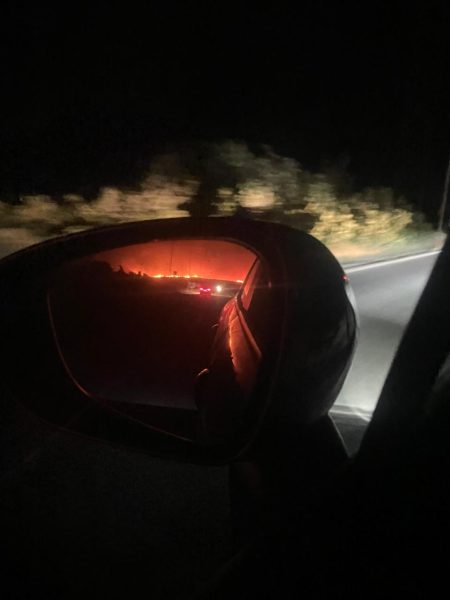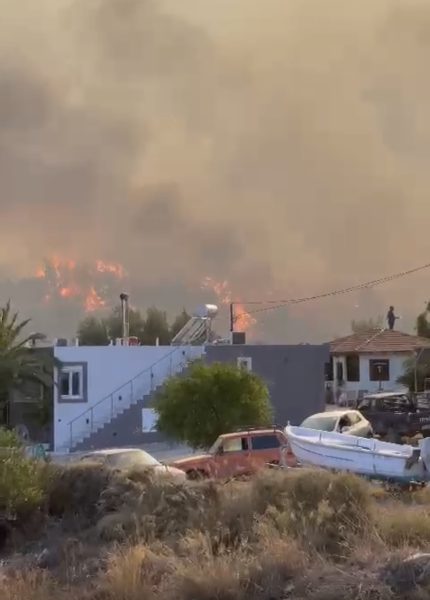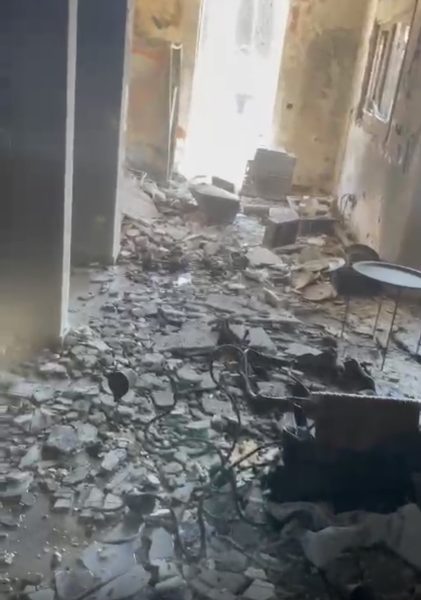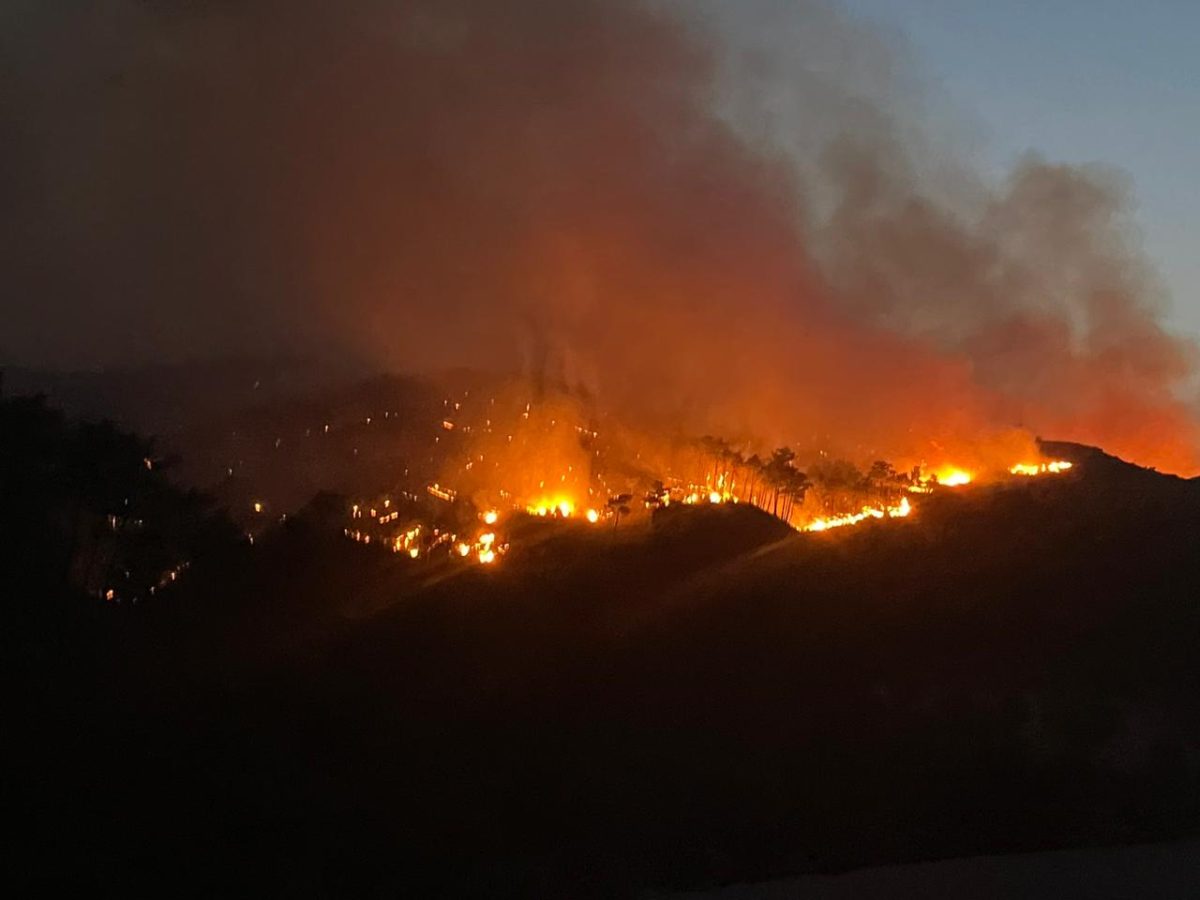In Greece, a place associated with beautiful beaches and delicious cuisine, and a popular vacation spot for people across the world, and one of Europe’s hottest countries, wildfires are an annual occurrence. However, July 17th, 2023 marked the beginning of the most devastating series of fires in the nation’s history.
The fires came as a surprise; at the time there had only been reports of extreme heat waves that had hit Europe that year. Tourists received a warning to stay inside. But what seemed like passing weather, when coupled with Greece’s expanse of dry lands and heavy annual winds, turned into an enormous blaze that engulfed over 200,000 acres of land.
The earliest fires started on Rhodes, one of the largest and most-visited islands in Greece, just after Crete. From ancient theaters to castles built by knights during the Crusades, it is home to countless monuments from various historic eras. People visit to enjoy the beautiful beaches, culture, and weather of Rhodes. But the hot, arid climate, along with the island’s large amounts of dry land and the exposure to winds from the Aegean sea make for a perfect environment for fires to spread.
“We thought it was a normal fire, because every year we have some,” said Vakianis Kiriakos, a local on Rhodes upon hearing about them in mid-July. “But they didn’t expect the wind change. It was only firemen that day, with no airplanes or helicopters. On Thursday, July 20th, 2023, the fires started heading to the south of Rhodes. I was spearfishing at that time. When I jumped in the water, the weather was clear, the sky was clear, and around six, when I got out – I saw the sky, it was red and black from the smoke. The fire was heading to us with tremendous force. A firefighter said there was no way they could control it.”
The equipment required by the Rhodes fire force – planes and helicopters capable of carrying up to 40 tons of water – wasn’t available. They were all being used in Greece’s capital, Athens, where another fire had broken out and spread similarly, due to the extreme winds. The national government rushed nearly all of the available resources in order to save the capital.

“On Friday, July 21st, they called the emergency evacuation – 19,000 people evacuated from the South of Rhodes…with their bags in their hands, in 46-degree weather, walking four kilometers. It was one of the most disturbing images I have ever seen in my life, because we didn’t have information. We didn’t have electricity or the internet because of the smoke. We didn’t know what exactly was happening,” said Kiriakos.
Many people had not realized that the evacuations had begun. Kiriakos was alerted by the stream of people outside the local store. Locals traveled with their cars, transported large jugs of water to give to the people evacuating, and took the elderly and children to safe areas where they could be evacuated by sea.
It was the desperation of the people that brought them together. “My main concern was the fires approaching Athens, because that was where my family lived. There was a point when they asked people living at the edge of Athens to evacuate,” said Eleni Skasilas ’24, a student at Bronx Science. “I knew that Greece would do anything to avoid their capital burning.”
On Rhodes, all the locals joined in to help with the fires. During the ‘hell days’, nicknamed so by Kiriakos, “every single person was doing their best to help these people. Thousands of people gathered stuff, paying by their own pockets, giving away whatever they could and just helping the whole system not crumble to do something good. It was just amazing. Even the regular people like us who didn’t have any experience with fires were doing something, whatever they could think of.”
The people on the island tried their best to organize themselves in such a short amount of time. One person created a fundraiser on GoFundMe which garnered thousands of euros to pay for medicine and clothing. Many avoided sleep for days in order to help the tourists who had to stay in the empty schools due to the fire. Others bravely went to where the fires broke out to try and save villages from burning.

“Volunteers created zones [which involved cutting down trees and removing other flammable objects] so the fire couldn’t pass through, but they didn’t expect what was coming towards them. I had people there that told me that they were afraid they were all going to die. The fire was coming towards them so quickly – they had no reaction time,” said Kiriakos. “There was a video of the fire going above the village… it was a video that made something inside me tell me that I had to stand up and go there. Not only me, but they needed people to go there right that moment… it was a video that was in my nightmares.”
The locals on Rhodes had thought that the firefighters had left them. The fire burned and killed trees and animals, destroying businesses and homes. The few firefighters that were not called to Athens had to drain water from pools in the backyards of houses in order to extinguish houses, but there never seemed to be enough to dispel the problem.
Four days after the first fire, Kiriakos made preparations to help. The fire began to spread through the village, burning numerous houses and cars. There were no firefighters there, only a small truck that could use water. “We had to extinguish it with dirt, and whatever else we could find,” Kiriakos said. But still, he and his friends tried to persevere, carrying as many fire extinguishers as they could back and forth in order to try and help what seemed to be an impossible task. This is what their lives were like for five days. “We got in a car with little or no gear, went to other villages to help them, went into the forest, helped the firefighters and volunteers. This was our lives, waking up at six while going to bed at three, just trying to help with whatever we had.”
Why was this one different?
Summer wildfires are common throughout Greece. In some cases, they are caused by people. Some of the local residents believed that these ones were, too. There are many agricultural villages near the center of the island, where the fires began. These villages typically use small, controlled fires in order to clear fields to prepare and clean them for the next season. An inexperienced farmer could find that their fire quickly gets out of hand and escalates. “Since these fields are in the middle of the forest with almost no precautions taken, it is very very easy for something to go wrong.” Kiriakos explained.

Regardless of the cause — whether it was ignited through field-clearing, intentional arson, or by an improperly discarded cigarette butt — it was certainly amplified by our currently worsening global conditions. As temperatures rise and winds become harsher, fires have a tendency to become more intense and spread easily. For instance, the wildfires that plague California and Australia every few seasons have gradually become more destructive. In places where fires can start easily, the hazardous firescan burn tens of thousands of acres if left out in the arid, windy climate.
“The wind was so strong that even though I am around one-hundred ninety pounds, it could lift me,” Kiriakos noted after visiting the area near Apollona, where the fires had started. The damages caused by the fire were too large to measure. Forests, villages, and massive hotels alike were burnt down. People’s homes were destroyed and their owners were forced to relocate. “But it is important to note that there were no direct victims from the wildfires,” said Kirakos.
On Rhodes, the fires burned out of control for twelve days, until finally, aid arrived at the island. Hundreds of firefighters from all over Europe, from countries such as Romania, France, and Slovakia, arrived with planes and helicopters which could carry twenty times the amount of water that a truck could.
Despite the terrible circumstances, it went to show the solidarity of the Greek people. “There was an unbelievable traffic inside the forest; everybody was out there risking their own lives, trying to do something good for their island,” Kiriakos said. Although it was the biggest fire in the nation’s history, the people on the island demonstrated the hospitality that made the Greeks famous.
“We have such a strong bond with our island – if you ask a lot of people, they will say we’re a broken generation, that we don’t care, that we’re only for computers and phones and the internet,” said Kiriakos. “But when the bells in our head rung, we just ran straight to help. We didn’t care.”
Regardless of the cause — whether it was ignited through field-clearing, intentional arson, or by an improperly discarded cigarette butt — it was certainly amplified by our currently worsening global conditions.

